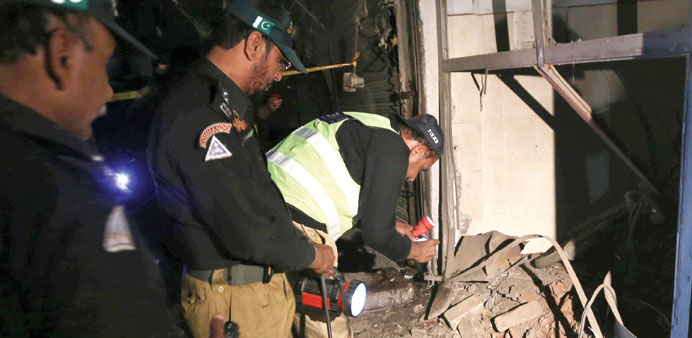BOMB BLAST IN LAHORE: Security officials inspecting the site of a bomb blast in Lahore yesterday. At least 16 people were injured when a bomb planted on a street exploded in Ichra market of the city.
AFP
Miranshah
At least 13 militants were killed in a bombing and a gunfight in Pakistan’s restive tribal areas yesterday, the latest clashes in almost a week of infighting between rival Taliban factions.
A total of 56 people have been killed in the violence which erupted on Sunday between supporters of commander Khan Said Sajna and followers of the late Hakimullah Mehsud group in troubled North Waziristan.
Both factions are part of the Tehreek-e-Taliban Pakistan (TTP) umbrella group, which has been waging a bloody seven-year insurgency against the state.
Ten insurgents were killed in clashes that began when members of the Sajna group came under rocket attack in their car in the town of Shawal, a local
intelligence official said.
Militant sources confirmed the clash and casualties.
The feud began after Sajna, a senior commander, was rejected for the TTP leadership following the killing of then-leader Mehsud last November, militants say.
The TTP has long been riven by infighting.
Sajna had been seen as a strong candidate to become TTP chief following Mehsud’s death.
But the movement’s ruling council at the last minute elected Mullah Fazlullah, who hails from Swat and is believed to be hiding in Afghanistan.
Separately, Sher Amanullah, a commander of the Haqqani militant network, was killed along with two others when a roadside bomb hit their vehicle near the town of Datta Khel, intelligence and militant sources said.
Amanullah is said to be a close associate of Mullah Sangeen Zadran, who was blacklisted as a terrorist by the United Nations and United States and was killed in a US drone strike in North Waziristan in September last year.
The Pakistani government began negotiations through intermediaries with the TTP in February to try to end its insurgency.
The militant group has demanded the release of what they call “non-combatant” prisoners and the establishment of a “peace zone” from which security forces would be barred.
A bomb attack at a market in Islamabad on Wednesday killed 24 people, though the TTP denied responsibility.
The fighting underscores the difficulty of trying to negotiate a peace deal with an insurgency that has no unified command, an analyst said.
“The Pakistani Taliban are unlike the Afghan Taliban. They are a loose alliance, they have no central command,” said author Ahmed Rashid, an expert on the militants. “Exactly who are we talking to? This is a question Nawaz Sharif has never answered.”
The government would be trying to seek advantage but had to tread carefully, said a security analyst.
“The policy of the civilian government is to make these people fight among themselves,” said retired general Talat Masood. “But if one wins, it will emerge stronger and far more dangerous.”
The analyst with the insurgent contacts said the government was trying to exploit the split by getting Sajna to agree not to attack government forces.
“They have sent Sajna several message but he has yet to respond,” said the analyst.
Taliban spokesman Shahidullah Shahid said commanders were trying to get the rivals to talk.
Imtiaz Gul of the Islamabad-based Centre for Research and Security Studies said the clashes were likely at least partly related to money.
“Tribal commanders are also plugged into organised crime and at time the feuds may not be stemming from political
differences,” Gul said.
Although security officials would be hoping the split would weaken the insurgency, Gul said he doubted it would.
The insurgents may be afraid of each other, he said, but they are even more afraid of being
divided and picked off alone.

